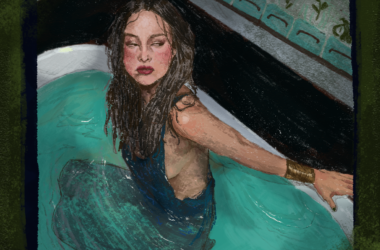Mastering the will-they-will-they-not tragicomedy is no enviable task in this day and age. When the world is quite literally on fire, we find ourselves confronted by questions of how cringey Tinder messages, first-dates-gone-wrong, and fleeting insecurities could possibly matter to us in the grand scheme of it all. Well, Sally Rooney has a hunch. In her latest novel, Beautiful World, Where Are You?, the Irish author searches for beauty among all the chaos—and manages to find it.
The novel follows publicity-loathing novelist Alice—who bears a striking resemblance to Rooney herself—and her best pal from college, Eileen, an editorial assistant at a Dublin literary journal. Faced by the spectre of wealth inequality, environmental collapse, and the meaning—or meaninglessness—of life, Alice and Eileen, both pushing 30, begin to feel the weight of the world on their shoulders.
The two fret about the state of the world via long, sometimes tedious, email exchanges, which nevertheless capture Rooney at her best: Elevating the voices of her generation and bringing their deepest fears to life. “Aren’t we unfortunate babies to be born when the world ended?” Alice at one point writes to Eileen. Doomed as they might be, the pair are able to carve out room for romance in their lives: Alice with the cynical Felix, Eileen with Simon, her older friend whom she has loved since childhood. Rooney fleshes these romantic entanglements out with her trademark wit and soul-baring prose.
Whether it’s the luck of the Irish or the charm of her all-too-relatable characters, Rooney has a way of making even the most microscopic interactions among us feel earth-shattering. Like brushstrokes, each sentence builds upon the previous, complete with wounded squabbles and broken glasses. There are pining glances and words left unsaid. There is bantering dialogue with freakishly articulate characters. There are Rooney’s infamous sex scenes, some of the most moving you will find in contemporary literature.
Rooney has become ordained as the voice of millennial angst. Her debut, Conversations With Friends, was a smashing hit, and her second novel, the Booker-Prize shortlisted Normal People, went on to be adapted into a quarantine favourite Hulu series. In a way, we might see Beautiful World as just another privileged, upper-middle-class declaration of existential dread. Maybe that’s what ticks off Rooney’s detractors, who typically dismiss her work as frivolous, normcore chick lit. Granted, her plots can be fairly Austenian: Her characters do their utmost to connect but, more often than not, fail miserably from the outset.
But Beautiful World presents Rooney at her most nuanced. Her Irish youths are simultaneously tone-deaf and self-aware; Alice, a reluctant millionaire, reflects, “but why should anyone be rich and famous while other people live in desperate poverty?” On the same page they wax poetic about Marxist revolution, Alice and Eileen also immerse themselves in dysfunctional relationships. With bull’s-eye precision, Rooney captures exactly what it feels like to be 20-something: To be able to recognize structural realities, while simultaneously remaining hung up on debates of whether one can—or should—text him first. Oh, the joy of being a millennial.
You might be asking where all that beauty Rooney promised in her title is. Why, it’s splashed all over these pages in tender celebrations of relationships and love. Even as the world collapses around us, we can always count on our basest selves to carry on: We who long to fall in love and delude ourselves and make catastrophic decisions about our crushes. We who stumble across the minefields of intimacy.
“So of course in the midst of everything,” Alice writes to Eileen, “the state of the world being what it is, humanity on the cusp of extinction, here I am writing another email about sex and friendship. What else is there to live for?” What else, indeed.









